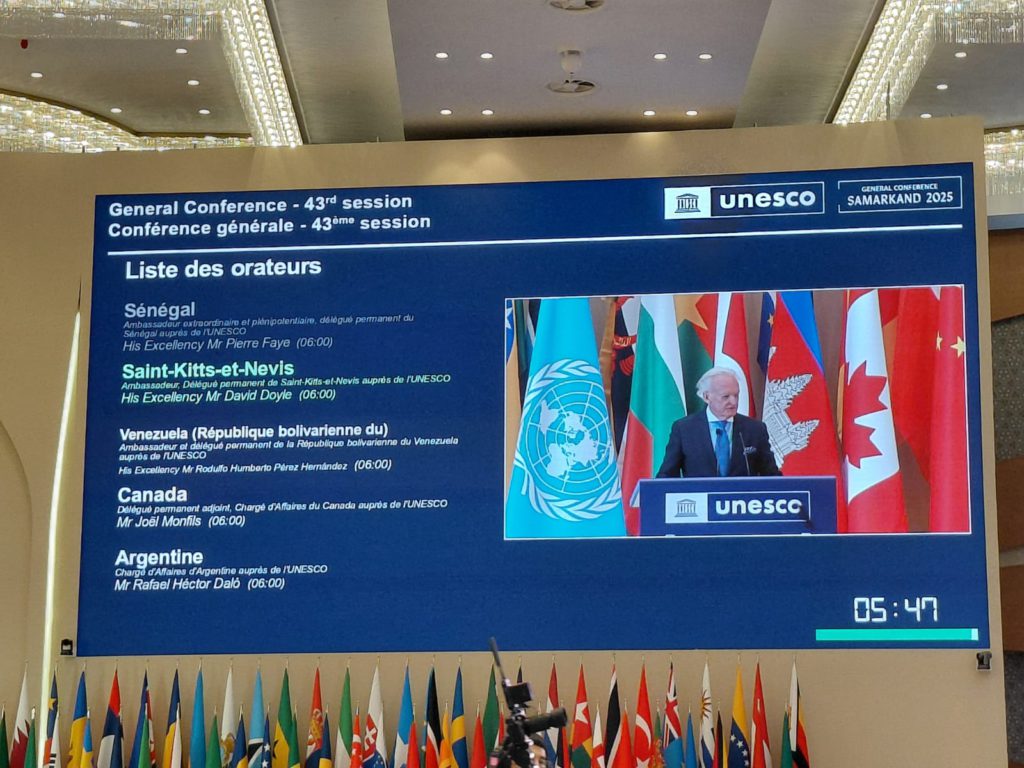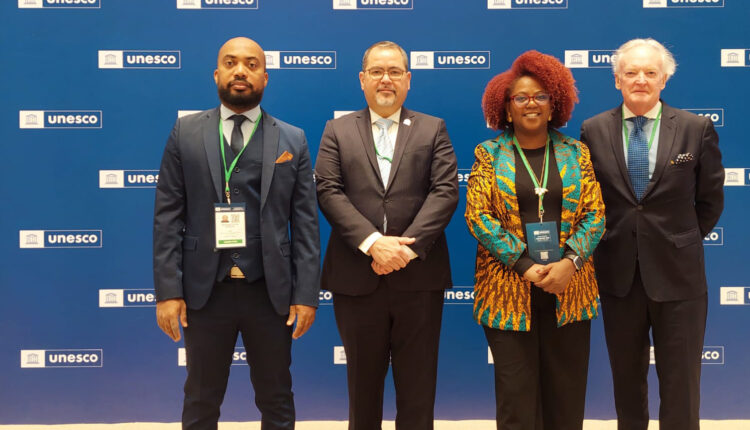SKN Reaffirms Support for UNESCO at 43rd General Conference
Ambassador David Doyle, Permanent Delegate to UNESCO, delivered the National Statement on November 4th, expressing appreciation for the specialised UN agency’s work in support of the country’s sustainable island strategy. He touched on the importance of international partnerships, especially through the unique expertise provided by UNESCO, in enabling the Federation to achieve the Sustainable Development Goals.
“The country’s long-standing association with UNESCO has yielded tangible results to the tune of hundreds of thousands of dollars in capacity-building expertise and support. UNESCO is therefore an indispensable partner in contributing to the Government’s ambitious Sustainable Island State Agenda.”

The Ambassador enumerated the contribution of UNESCO to St. Kitts and Nevis, referencing its “meaningful guidance and advice on important education, sustainability and biodiversity policy reforms in support of this national Agenda”. He highlighted several key areas of collaboration between St. Kitts and Nevis and UNESCO that have had a profound impact on the people of the Federation. These include:
· Professionalizing the teaching force and strengthening the national qualifications accreditation system.
· Establishing the Federation’s intangible cultural heritage policy.
· Introducing education for sustainable development into the national curriculum.
· Transforming the UNESCO-accredited Man & Biosphere Reserve into a biodiversity-led agricultural zone.
· Developing community seed banks and shaded-greenhouse cultivation.
“The UNESCO’s support is enabling our teachers to scale-up their qualifications to bachelor’s degree level trough access to remote-based studies with the Open University of Tanzania. A similar initiative is being negotiated with Technology University of Kenya to provide remote-based training for our TVET teachers. Leveraging digital technologies to enable deeper south-south collaboration not only reduces the digital divide but also allows us to advance quality education”.
Ambassador Doyle noted the pride with which residents and stakeholders of the Canada to Ottley’s areas participated with UNESCO in transforming the agency’s accredited St. Mary’s Man & the Biosphere Reserve into a biodiversity-led agricultural zone. “Plans are being drawn-up to now develop community seed banks to cultivate new indigenous fruit and vegetable varieties immune to drought and heat and shaded-greenhouse cultivation”
Some sharp advice was offered to UNESCO by the St. Kitts-Nevis delegation: “Budget challenges facing UNESCO means that there is urgent need to identify and singularly focus on the most urgent and tangible activities of relevance to SIDS. We must avoid dissipation and fragmentation of resources by trying to do everything. Effectiveness rather than efficiency should be central to the new UNESCO operational model.”
With small island developing states in mind, Ambassador Doyle urged the new management team at Paris HQ to retain and strengthen the unique UNESCO expertise specific to the Sustainable Development Goals (SDGs), relating to quality education, mitigating climate change and its impacts, clean water and sanitation, and conserving life on land, especially, stemming biodiversity loss.
“Armed with a more streamlined and focused SIDS plan, resources could be more readily raised to ensure that the UNESCO is optimally deploying its distinct core competencies and expertise.”
Turning to the commendable emergence of new initiatives by UNESCO in the field of cultural and creative industries, the Federation’s envoy stressed the promising benefits that could be derived by SIDS in helping them to develop a more structured and professional industry sector, attracting private investments and elaborating business models.
The Ambassador also highlighted the perennial challenges associated with freshwater supply in the Caribbean, citing recent FAO studies that show the region accounts for seven of the world’s top 36 water-stressed countries. He called for a re-focused orientation of UNESCO’s Intergovernmental Hydrological Programme to better understand the water cycle and hydrological processes in SIDS.
The 43rd General Conference in Samarkand has been hailed a success and has adopted UNESCO’s work programme and budget through to 2027, as well as electing members of its governing bodies, the main being the confirmation of H. E. Khaled al-Anani, former minister of tourism and antiquities of Egypt, the new Director-General of UNESCO. It also addressed issues such as discrimination in education and illiteracy; the study of national cultures and the training of local specialists; challenges in social sciences, geology, oceanography and the biosphere.
“By all indications the participation by the Caribbean in Samarkand has been active and fruitful, particularly in giving voice to the SIDS perspective as well as expressing regional priorities and concerns. I highly commend Ambassador Doyle and Ms. Jazzée Connor for their rigorous interventions on behalf of St. Kitts and Nevis during the General Conference and the Youth Forum”, stated H.E. Nerys Dockery, Secretary-General of the St Kitts and Nevis National Commission for UNESCO.

